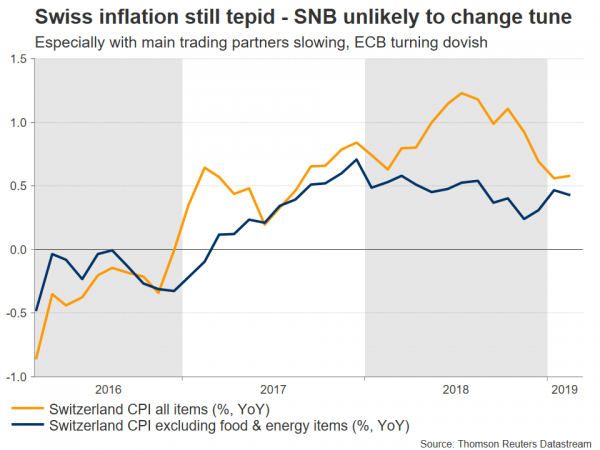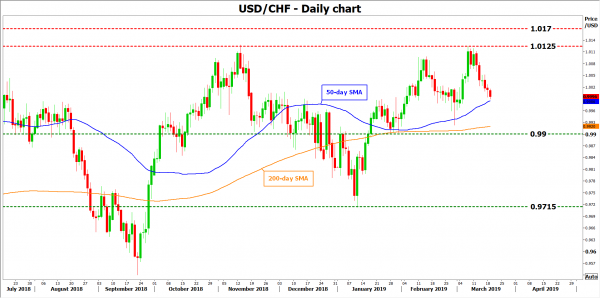The Swiss National Bank (SNB) is expected to keep its policy rates unchanged at the lowest level globally when it announces its decision on Thursday, at 0830 GMT. Domestic data are lackluster, Switzerland’s main export markets are slowing, and most importantly, the ECB turned dovish lately. Combined, these imply the SNB will probably retain an ultra-dovish tone. While such signals would argue for a slow grind lower in the franc, any risk-off global incident could trigger episodes of sudden appreciation in the safe-haven currency.
There isn’t much to celebrate in the Swiss outlook. The economy contracted in Q3 2018, and while growth bounced back in Q4, the recovery was short of impressive. Meanwhile, headline and core inflation remain anemic, with both rates hovering near the 0.5% mark in yearly terms. The only bright spot is the labor market, where the unemployment rate is almost at a two-decade low, but that tightness has failed to translate into faster wage growth and hence stronger consumption.
The external environment isn’t any better either. Switzerland’s largest export market, the Eurozone, is mired with issues – most notably a slowdown in growth. The same applies to China, and to a lesser extent the US, the nation’s other main trading partners. Exports account for roughly 65% of Swiss GDP, so faltering growth overseas has severe consequences for the domestic economy as well.
Staying abroad, it’s also crucial that the European Central Bank (ECB) turned more dovish lately. It’s not obvious, but this has enormous implications for SNB policy. To explain – the Swiss central bank typically mimics the ECB’s actions, but with a short lag. This is done to avoid any appreciation in the Swiss franc versus the euro, something the SNB pays a great deal of attention to. A stronger currency makes a nation’s exports less attractive abroad, and also pushes down on the price of imports at home, implying both slower growth and lower inflation.
Hence, the SNB has gone to great lengths to prevent the franc from strengthening, regularly intervening in the FX market directly to weaken the currency, and keeping its interest rates at the lowest level globally. Blending these all together, the ECB’s dovish pivot leaves the SNB no realistic option but to remain extremely dovish, as anything short of that could lead to a sudden and fierce appreciation in the franc against the single currency; a route the SNB definitely wants to avoid.
What does this all mean for the franc? Assuming the SNB reaffirms its dovish bias, and perhaps even strengthens it, for example by signaling it could still ease policy if needed, then that would argue for a slow grind lower in the Swiss currency on a relative interest rates basis. That being said though, interest rate differentials are not all that matters for the currency market. Namely, the franc is widely considered a safe-haven asset, which suggests that if any major risk-off event occurs in global markets, then it may gain rapidly.
Put differently, although the currency could slowly surrender ground on ‘calm’ days owing to monetary policy, any episode that induces ‘panic’ in markets may trigger a sharp rally, potentially erasing months of losses. The flipside to that: any such appreciation would most probably see the SNB step into the market and sell francs, to keep a lid on the currency’s gains.
Technically, looking at dollar/franc, advances may encounter resistance at 1.0125, the area that capped that rally in mid-March. An upside break could open the way for 1.0170, marked by the highs of March 2017.
On the other hand, a pullback in the pair may meet immediate support at the 50-day simple moving average (SMA), currently at 0.9986. A downside violation could see the sellers challenge the crossroads of the 200-day SMA at 0.9920 and the 0.9900 handle.


